The upcoming Los Angeles Premiere of Daniel Talbott’s Slipping not only marks the L.A. debut of the New York-based Rattlestick Playwrights’ Theater, it brings 26-year-old Broadway star Seth Numrich back to the City Of The Angels for the first time since 2007, when he played Dakin in Alan Bennett’s The History Boys at the Ahmanson.
Seth’s most recent Broadway lead (in no less than the title role in the Lincoln Center revival of Clifford Odets’ Golden Boy) followed his much talked about star turn as Albert in the Tony Award Winning War Horse, the Minneapolis native having made his Broadway debut as Lorenzo in the 2010 revival of The Merchant of Venice opposite Al Pacino.
The youngest student ever admitted into the drama department at Juilliard, Seth has since amassed numerous off-Broadway and New York credits including the role of 17-year-old gay teen Eli in Slipping’s 2009 New York Premiere, a part he will soon be reprising at Hollywood’s Lillian Theatre opposite his New York costar MacLeod Andrews under playwright Talbott’s direction.
Seth took time out of a very busy schedule to chat with StageSceneLA about the road from Minneapolis child actor to Broadway leading man.
Hi Seth! It’s not every day that a New York-based company opens a show on the West Coast, and particularly not in one of L.A.’s hundreds of “99-seat” houses. Can you tell me how the idea came about for Slipping to travel west with its writer/original director and two of its original stars?
Sometime last year David Van Asselt, who runs Rattlestick, told me that they were interested in producing theater in Los Angeles, and that he wanted Slipping to be the first production. I told him I thought it was a great idea and that I would love to be involved. I’ve never had the opportunity to revisit a role that I had worked on before, so I was excited to get that chance, and also to be able to work with Daniel, MacLeod and Wendy [vanden Heuvel], who are some of my closest friends and artists who I respect and look up to.
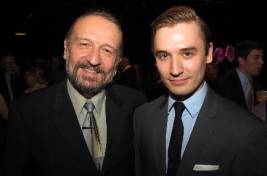
Charles Numrich and son Seth (Photo: Sara Glassman)
We’ll get back to Slipping a bit later, but first I’d like to know more about your background. I’ve read that you were home schooled by your parents, respectively a well-known Minneapolis-based actor-director-playwright and a nurse practitioner. What kind of things do you feel you gained from home schooling?
Looking back I feel really fortunate to have been home schooled. I feel like it gave me a certain amount of self-discipline that comes in handy as an actor. I think that a good education should be about learning how to learn, and developing an appetite for knowledge. I feel like my parents instilled that sense of curiosity in me, and now whenever I work on a new role I get very excited about research and discovering the world of each new project.
Do you ever feel that you “missed out” on what other kids had in a public or private school experience?
The potential downside to home schooling is a lack of social interaction, but I started doing theater at a young age, so I spent a lot of time around people of all ages. I can still be a little socially awkward sometimes, but hopefully not too bad.
 Was there ever a time when theater and the arts weren’t a part of your life?
Was there ever a time when theater and the arts weren’t a part of your life?
I’m lucky that art has been a part of my life for as long as I can remember. The Twin Cities in Minnesota where I grew up are actually full of arts and cultural institutions, and my parents were very interested in exposing my brother and I to that world.
Was there a moment when you suddenly realized that theater and the arts weren’t a part of the average kid’s life, or at least not to the extent that they were in yours?
I remember coming to drama school and assuming that everyone had grown up seeing high quality theater and art, and being surprised that that wasn’t the case. I definitely appreciate that aspect of my childhood more now.
By the time you started studying at Juilliard at the age of sixteen (as their youngest drama enrollee ever), you’d probably already spent more time on stage than performers many years your senior, yet I’ve read that you needed to “unlearn” everything you’d learned in the Twin Cities when you got to Juilliard? What was is specifically that needed to be relearned?
Part of the training process is about recognizing habits that you have as an artist, and broadening your spectrum of choices. I think it’s less about unlearning and more about adding to your artistic toolkit. As a child actor I was really just working off of instinct, which isn’t that different from how I work now, but now I have more tools at my disposal for the various artistic challenges that arise. I think another important part of training is developing an ability to work off of other people. When you’re acting as a kid there’s often an element of “Look at me!” going on, but that’s not really acting. The work really lives between the actors onstage, and between the actors and the audience.
You were just sixteen when you started at Juilliard, a program that has a wider age diversity than a lot of BFA programs. How did you fit in as a teenager among students who might even have been twice your age?
I think I put more pressure on myself than anyone else did. I’m not sure that anyone else really cared that much, but I had some anxiety about being “good” and proving to the world that I could cut it with older and more experienced actors. For the first couple of years I worried a lot about getting things “right.” I think that I really started getting more out of the training later on when I realized that there’s no such thing as “right” when you’re an artist, and that sometimes getting it wrong is much more interesting.
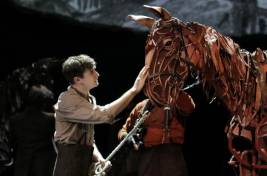
Seth and “Joey” in War Horse (Photo: Paul Kolnik)
You’re probably best known for a trio of productions—your Broadway debut opposite Al Pacino in The Merchant Of Venice, your starring role opposite a horse named Joey in War Horse, and most recently, the title role in the Broadway revival of Clifford Odets’ Golden Boy. Having shared the stage with the legendary Mr. Pacino and violated W.C. Field’s famous advice to “never work with animals or children,” albeit a horse of the puppet variety, how different was it being the center stage (or should I say “center ring”) in Golden Boy?
I’ve been really lucky in the past few years to get to work on some very exciting plays. Golden Boy has probably been my most difficult acting challenge to date. I was sort of terrified going into it, knowing the history of the play and the particular challenges of the character. The experience turned out to be a really amazing one for me, in pretty much every way.
Why is that?
I was working with some of the best actors in the world, and one of the smartest, most passionate directors in the business in Bart Sher. I learned so much from being around those people, and working on such an extraordinary piece of writing.
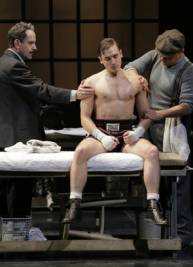
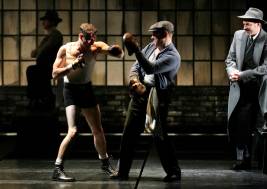
Seth in Golden Boy (Photos: Paul Kolnik)
You’ve only recently turned 26 (during Golden Boy’s final performances), but have achieved fame and success not many actors get to know at such an early age. How have you gone about not letting it go to your head?
Fame is probably an over-statement, but yes I’ve been really fortunate in the opportunities I’ve had so far in my career. My goal since I graduated has been to do work that I believe in and that I think is interesting, in whatever form. It’s been great to have the chance to do that in numerous contexts, and I hope that I can continue to make a life as an artist doing work that I think is important. And also pay rent.
You’ve been quoted as saying you dislike auditioning, and wish you could enjoy it as some actors do? I’m curious what it is about the audition process it is that you don’t enjoy.
I have a hard time with auditioning because it often doesn’t feel like acting.
How do you mean?
What we do as actors is collaborative. It’s about something happening between people. In other words, it’s impossible to act in a vacuum, which is sometimes what auditioning feels like. On rare occasion you’ll get to work with a really great casting director, or an amazing reader, and sometimes a director will really take the time to work with you. But more often than not it feels like you are expected to come into the room and “perform” or impress someone, which can be frustrating.
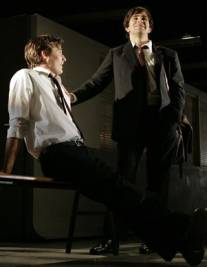
Seth and Brett Ryback in The History Boys (Photo: Craig Schwartz)
As I was reading up on your career for this interview, I realized that I had seen you onstage at the Ahmanson a little over five years ago in The History Boys opposite some of our most talented L.A.-based actors, including Brett Ryback, Edward Tournier, and Ammar Ramzi. What’s it like being back in L.A a half-dozen years later?
That production was one of the first things I did after graduating, and it was a great experience for me. I’ve been back to L.A. a few times since then to visit, but having the chance to perform here again is very exciting. Living in New York where it’s cold and noisy and lacking in good hiking, it’s always tempting to think about being out here.
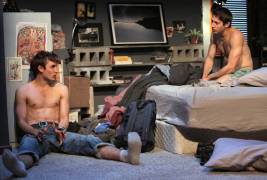
Seth and MacLeod Andrews in the original off-Broadway production of Slipping (Photo: Paula Court)
You’re about to revisit a play you starred in almost four years ago in the role of Eli, a gay 17-year-old who moves from San Francisco to quite a different new life in Des Moines, Iowa. How does it feel returning to this piece along with its writer-director Daniel Talbott and your costar MacLeod Andrews, and more specifically, do you think it’ll be any harder slipping into a teenage skin now that you’ve reached the ripe “old” age of 26?
I’ll admit I’m a little nervous about playing a teenager again, but when I get in a room with Daniel and MacLeod the maturity level drops to somewhere around middle school, so that helps. I’m really happy to be working with them again on this play, I feel like we all have a different perspective on it now, which is helping us rediscover the story. I think the play is getting better. Daniel is one of my closest friends and a frequent collaborator, and I always love working with him because he’s interested in true collaboration and encourages us to be part of the creative process.
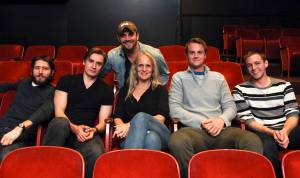
Seth, director/playwright Daniel Talbott, and the Los Angeles cast of Slipping (Photo: Garrett Davis/Capture Imaging)
Gay teens have been considerably more visible in the years since Slipping debuted, with the It Gets Better Project focusing on the prevention of LGBT teen suicides, and more and more gay teens finding their own voice on YouTube, Tumbler, etc. Does this make Slipping any more relevant today?
We were talking about this in rehearsal the other day. It actually seems to affect MacLeod’s character slightly more than mine. He plays Jake, a young guy from Iowa who discovers that he’s gay, and is totally fine with it and not conflicted about it at all. There was some criticism from the first production that his character wasn’t believable. I think fortunately it’s becoming more “okay” to be out now, and hopefully there are more people like Jake who have supportive families and don’t feel the need to hide who they are.
You did boxing warm-ups before Golden Boy? How will you warm up for Slipping, and what kind of music do you think you’ll be listening to in order to get in the mood for the show?
I’m listening to a lot of The Smiths, Joy Division, Smashing Pumpkins… I’m not boxing at the moment because it doesn’t feel quite right for Eli, but I’ve been running in Griffith Park every day, which is wonderful.
You’ve done some film and TV in the past, including the lead in the recent independent film Private Romeo, and I’d imagine you’d like to do more. Is one of the reasons for doing Slipping in Hollywood an interest in being seen and remembered for future film and TV roles?
Funny enough, I actually got cast in my next on-camera job before we started working on Slipping.
Fantastic! What’s that going to be?
Next month I’m doing a role in a pilot called Turn for the AMC network. It’s about spies during the Revolutionary War.
Will you continue to be New York-based, or do you see yourself as becoming bi-coastal or even L.A.-based the years ahead?
I’m not really sure, to be honest. I guess I’m just hoping to keep working on cool projects, wherever they might be.
You’ve become very involved for quite a few years with an organization called Artists Striving to End Poverty. Can you talk briefly about what this organization does?
ASTEP is an organization that focuses on arts education outreach work with kids all over the world. We have programming in NYC, South Florida, India, South Africa, and Ecuador.
How did ASTEP come about?
The organization sort of started as a student group I was part of at Juilliard that did outreach work, and has grown into a global non-profit over the last decade. I’ve had the opportunity to work as a teacher, and offer the arts to students who might not normally have access to them.
How has working with this organization affected you personally?
I’ve gained an enormous amount from working with ASTEP, not least of which is a sense of perspective. I think I take certain things for granted living in New York and being involved in the arts. Having the chance to rediscover my art form with young people who are experiencing what it is to express themselves for the first time is pretty awesome. If anyone wants to get involved you should check out our website at asteponline.org.
Seth, thank you so much for taking the time to chat about your career, and more specifically about Slipping. It’s exciting to have you and Rattlestick Playwrights Theater as part of our rich and vital Los Angeles theater scene!
Slipping runs from April 4 through May 5. Rattlestick @ Elephant Stages’ Lillian Theatre,1076 Lillian Way, Hollywood. Thursdays, Fridays, and Saturdays at 8:00. Sundays at 3:00 and 7:00. Reservations: 800 838-3006




 Since 2007, Steven Stanley's StageSceneLA.com has spotlighted the best in Southern California theater via reviews, interviews, and its annual StageSceneLA Scenies.
Since 2007, Steven Stanley's StageSceneLA.com has spotlighted the best in Southern California theater via reviews, interviews, and its annual StageSceneLA Scenies.







 COPYRIGHT 2024 STEVEN STANLEY :: DESIGN BY
COPYRIGHT 2024 STEVEN STANLEY :: DESIGN BY